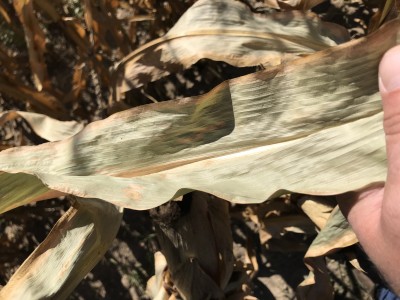Local Frost Advisories - What it Could Mean for Corn Producers in Southwest New
Joshua Putman, Field Crops and Forage Specialist
Southwest New York Dairy, Livestock and Field Crops Program

Frost can mean yield loss for crop producers, although the severity of damage varies based on crop maturity, topographical features and local climate conditions. A corn-killing freeze occurs when temperatures fall to 32 F for several hours or 28 F for a few minutes.
Damage occurs from freezing temperatures because living plant tissues contain water. As ice crystals form, they expand and puncture cell walls. As the temperatures rise during the morning, the ice crystals melt back to a liquid. The punctured cells lose water and nutrients and die. Frost damaged plant tissue often has a water-soaked appearance. This appearance later turns into brown, dead plant tissue. Damage will start to show up 1 to 2 days after a frost has occurred.
Late-season frost damage can affect grain quality and yield and is directly proportional to the stage of maturity and leaf tissue killed. Severe impacts on grain quality can occur at mid-dough, while moderate impacts are seen at the dent stage. By the time the kernel has reached half milk line, only minor impacts will occur to grain quality. Yield losses are negligible if frost occurs when grain moisture is below 35 percent. Differences among hybrids, overall plant vigor at the time of frost, and subsequent temperatures will all affect final grain quality and yield.
Severe plant tissue damage can lead to defoliation. If you suspect your corn has been damaged by frost, you should consider consulting the National Corn Handbook NCH-1 "Assessing Hail Damage to Corn" (Vorst, 1990). This publication has charts used by the National Crop Insurance Association for assessing yield loss due to defoliation. Knowing how to recognize frost damage and assess probable loss is important for decision making. An abbreviated version of the loss chart is shown in Table 7 below. For example, corn that was defoliated 20% at the milk stage would have 3% yield loss.
Frost damage can be difficult to identify late in the season as it is easily confused with common fungal leaf diseases such as northern corn leaf blight. If you have questions regarding the condition of your corn crop or if you don't have access to an electronic version of the "Assessing Hail Damage to Corn" guide, contact Josh Putman. For more information on corn maturity and frost, visit https://www.agry.purdue.edu/ex...
Upcoming Events
WNY Pastureland Conversion & Soil Health Field Day
July 16, 2025
Middleport, NY
Join American Farmland Trust for the Western New York Soil Health Field Day on July 16, 2025, at Zeliff Farm in Middleport, NY, from 9:00 AM-3:15 PM. Learn about pasture conversion, soil health benchmarking, biochar in grazing systems, and best grazing practices. Plus, enjoy hands-on demos with the NY Soil Health Trailer, drones, and cover crops! Check out the attached agenda for more information about the field day and REGISTER HERE. Zeliff Farms is a regenerative beef operation who has recently partnered with AFT on outreach and education to farmers including learning circles and evaluating biochar effects on soil health.
IPM Strategies to Protect Corn and Soybean Seed in NY
July 30, 2025
Hamburg , NY
SWNYDLFC and Cornell IPM are hosting a grower meeting to discuss integrated pest management strategies for protecting corn and soybean seed in New York.
FAMACHA Training for Sheep and Goat producers in Woodhull NY
August 13, 2025 : FAMACHA Training in Woodhull
Woodhull, NY
Join us for a discussion and hands-on training for internal parasite integrated pest management in sheep and goats. Certification is available to all students participating in the workshop.
Announcements
No announcements at this time.





